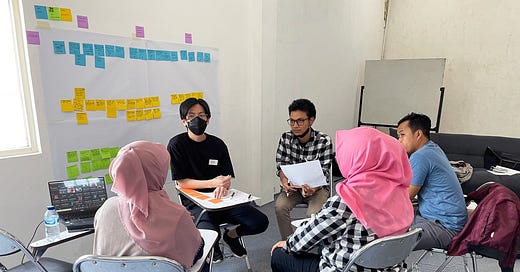Dear Budi: "I'm always interested in talking to users and identifying their problems. But my project usually takes two weeks. I have no time to talk to users. What should I do?"
Find the next project in your roadmap and conduct the research ahead of the time. Talk to users and gain insights for that next project.
Each month, I answer a few questions from my readers. I leverage my experience as Head of Design and Principal Product Manager. Click here to subscribe to my newsletter.
Question: "Hi, Budi. I am always interested in talking to users and identifying their user problems. However, my project usually only takes two weeks. So I have no time to talk to users before designing. I tried negotiating the timeline, but no luck. The team needs to deliver something in 1-2 sprints. We mostly build a feature based on what our VP of technology thinks is the right thing to build. But sometimes, I don't feel the solution necessarily solves any problem. Any tips?"
Thanks for the question! I hear you—not knowing the user's problems can be frustrating. The biggest problem with your condition is finding the time to research. Here’s my short answer: Find the next project in your roadmap and conduct the research beforehand. Talk to users and gain insights for that next project.
You don't want to be controversial.
First, let's talk about the culture. If talking to users is not part of your company's culture, you don't want to preach and demand people to do this. The reason is simple; not all research can yield insights quickly. You might need a few experiments. Imagine if you're being demanding, "Hey, we need to do this research properly." You'll feel tremendous pressure to return to the team with actionable insights. So here's the plan...
Find out what the next project is in the roadmap.
If negotiating about the timeline doesn't work. You better prepare research for the next project. Discuss with the product manager and ask about the next project in the roadmap. Identify the project your PM feels critical or unsure about the problem. The plan is to find a project you'll pick up in the next four weeks. Then, do the research for this project ahead of time.
Keep it lowkey
If you don't have much experience in interviewing users. Keep things low in the beginning. You don't have to announce to people that you're planning to talk to users. Keep it low, especially if the company doesn’t have a culture to talk to users.
Recruit participants. Find your way to get the customer's data if you can. Reach out to them. You might find a challenge in determining who or what type of users you should contact. This is where the target audience will be useful. It would be best if you defined the characteristic of the users. Read my old essay on this topic: https://newsletter.buditanrim.co/p/feature-target-audience or https://newsletter.buditanrim.co/p/how-to-define-the-target-customers
Prepare the questions. Before you talk to the real users, you want to create the research script. It's a list of questions. Make a bullet point of questions you want to ask. My favorite questions are:
Intro
Can you tell me a bit about your role?
How long have you been doing this?
What's the hardest part about your job?
Problem
What is the biggest challenge you're facing now?
How often do you experience < the challenge >?
When was the last time you experienced it?
What makes it hard?
What have you done to solve it?
If users mentioned any solution—what do you like? What do you dislike?
These questions are starting point. You might need to modify this. If you ask these questions, you’ll get an overview of their problem.
Build the trust battery
Once you get some interesting insights, share them with your team. You want to build the trust battery. Show that by talking to users. You can help clarify the problem. Bonus:
P.S. That’s in a nutshell. It’s hard to explain this in one essay. But I hope you found this useful! If you're interested in learning and getting hands-on practice about this, join the waitlist for my upcoming two-week problem discovery course. Visit https://joincrafters.com/
Before you go.
1 - Subscribe to this newsletter. Get new essays in your inbox:
2 - Share this with others. This newsletter depends on word-of-mouth. The more subscribers, the more questions and the more relevant content. Please copy this link and share it.
3 - Like this essay! Knowing which content is relevant will help me expand on other relevant topics in the future.
4 - Let’s connect. Every month, I talk to ten people who subscribe to my newsletter. I’d love to listen to your challenge, which will help me make relevant essays. If you want to connect, please fill out your information here. I’m looking forward to chatting with you :)




